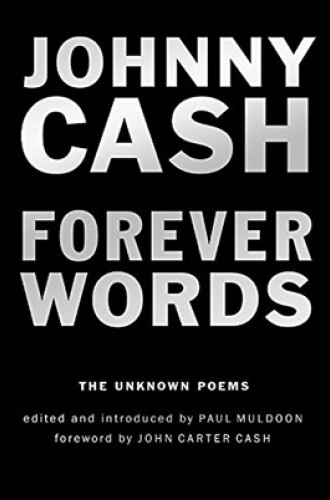Johnny Cash is presented in this book as a celebrity literary poet, with photographs of his handwritten pages appearing as illustrations. Cash was a singer, songwriter, movie actor, and television personality who sought public acclaim through live performances and recordings. Certainly he was a celebrity, one of the most popular entertainers of his generation. Whether he wanted to be known as a literary poet is a question to ponder.
If these poems do not establish Cash as a literary artist, at least they show the depth of his relationship with words. A complex and reflective man, he knew the power of crafted words in reaching an audience, the importance of words in guiding his personal beliefs and values, and the usefulness of words in shaping his legacy. His deeply resonant speaking and singing voice, so familiar and so often parodied, can almost be heard in these rough, sad, earnest, and funny lyric poems. Missing from all but a few of them is a good tune by which we might remember them. A poem titled “Forever” from 2003, the year Cash died, ends with the lines, “the trees I planted still are young / the songs I sang will still be sung.” This book aims to place a new selection of Cash’s lyrics into circulation, that they might be read and remembered.
In the foreword, John Carter Cash writes that when his father died he left behind piles of personal papers and documents. The poems published here were chosen from hundreds discovered in those stacks. One imagines that many of them were written to be shaped into song lyrics. A love poem, “Let’s Put It to Music,” builds to the lines, “Let’s put it to music / Sing about it.” A talented and charismatic performer, Johnny Cash was first of all a singer.
A poem titled “The Things We’re Frightened At,” dated April 26, 1944, gives evidence that even at age 12 Cash wanted an audience. The poem shows a boy at the door of adolescence, trying to talk himself out of being afraid of the dark by laughing at younger boys’ fears, trying to grow into a man by matching the steps of his father, turning his attention outward to an unknown audience as he tells of a cousin who “[is] worse than I am / He’s afraid of ghosts. Are you?” Turning to lyric poetry as a way of working out pain, disappointment, religious belief, and life transitions—whether the lyrics were set to music or not—was a pattern that seems to have spanned most of Cash’s life.
In 1980, Cash became the youngest living person to be inducted into the Country Music Hall of Fame. The years immediately before and after that were difficult, both professionally and personally. His popularity as a singer had waned somewhat, and country music had gone on without him. His marriage to his second wife, June, was failing. His use of prescription pills to manage the stresses of life on the road increased, resulting in uncomfortable scenes at performances and between shows. Elvis Presley, whom Cash admired, died a bloated, drug-addicted caricature of his younger, charismatic self. Cash worried about the trajectory of his own career and about his legacy as a performer.
As he tried to find a way out of this turmoil, Cash turned from prison songs and train songs to gospel music. The title and last line of a poem from 1980 points out the entertainer’s feeling of loss, “Does anyone out there love me?” He had been baptized as a boy in an Arkansas river. Now, as an adult, he gave his life to Jesus in the manner recommended by his friend Billy Graham. He studied scripture and wrote a novel about St. Paul. He took a pilgrimage to the holy land and made a movie about the life of Jesus. He continued to look to words for answers to the truth about life: words of scripture, words of others, and words of his own.
A long poem titled “Job,” dated to the early 1990s, shows the poet’s confession that he had suffered greatly in his own life, and a testimony that he had lived to see a day of grace:
Job Job watch what you say
The Lord let Satan have his way
Don’t give in and don’t give up
The Lord could soon refill your cup
You could make a comeback still
with cattle on a thousand hills.
By the time he wrote this poem, Cash had reinvented himself and found a new audience. A lifelong student of American music, he branched out from country and gospel to folk, rock, and punk, recording with U2, Paul McCartney, and other artists.
Fans of Cash might regard this book as a volume of memorabilia, with new compositions to ponder and images to enjoy. Others might see it as a product of our celebrity culture.






